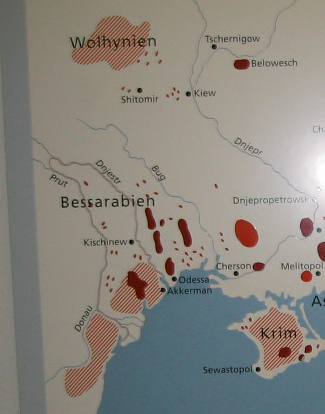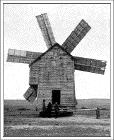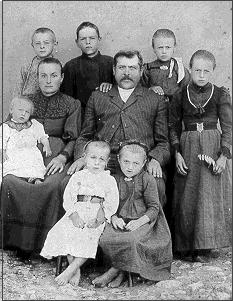Last Updated: 18 Nov 2003
REMMICK's
German - Russian's
Index of photographs of memorabilia.
MAP #1
of
GERMAN COLONIES in RUSSIA
 *
*
Germans migrated from the German States to Russia for many reasons. There was the call of craftsmen needed for Peter I "the Great" who wanted Germans to teach his Russians their craft to build his "New" European Russia. Later, Catherine II "The Great" called for craftsman and farmers to settle areas her generals had just conquered. The Germans heard her call and arrived in large numbers. When the French Revolutionaries marched from one German village to another with the guilotine, Germans fled eastward. Many German officers joined Alexander I to fight Napoleon..... After Napoleon's second defeat, many heard the offer from Alexander I of free land, freedom to workship, and exemption from military service and a new wave of German emigrated to Russia.

![]() See
dates of Historial Importance for Germans who migrated
eastward.....
See
dates of Historial Importance for Germans who migrated
eastward.....
 +
+
![]() Historial
dates important to the History of Besssarabia
Historial
dates important to the History of Besssarabia
Bessarabian German-Russian Colonies were found in the southern part of Russia known as the "New" Russia in 1814. Many of us label the area as S. Russia in our records.... In 1856-1878 Congress of Berlin united Bessarabia, Moldavia and Walachia and Borodino fell under the rule of Rumania1878 when the Congress of Berlin restored this area of Bessarabia to Russia and united Moldavia and Walachia. During the Russian Revolution of 1918 and the Russian Civil War 1918-1922/5, the lives of the German-Russians deteriorated under the communist government, the USSR, who viewed them as "Kulaks", enemy of the people.

Their land was taken. It was illegal to feed the "Kulaks" and families starved as the husband and older sons were taken from the house and shot or vanished.... One of these men was my grandmother's [Christina, nee Schweikert, Hein's]
![]() Hein Family History
& Schweikert [Schweickert, Schweigert] Family History
Hein Family History
& Schweikert [Schweickert, Schweigert] Family History
brother, Jacob Schweikert, who was arrested in 1917-18. The local CHEKA had labeled him as a "Kulak". Jacob was placed in a box car and then placed in a Salt Mine in Siberia. He was allowed, after a long period of time, to write two letters a year to his family. The last letter came from him was sent in 1956. He had outlived his wife and children some thirty-seven years because his wife and children had starved to death about 1918, because no one was allowed to sell them food because their husband / father was a "KULAK".
![]()
 +
+
Jakob Schweikert , who had been born in Borodino / Bess. S. Russia, was labeled as a Kulak by the local CHEKA in 1918 in Russia. He was sent to Siberia in a box car and placed in a Salt Mine where he may have died about 1956. The last letter from his wife in abt 1919 informed relatives in the USA that her children were starving and had begun eating the ends of their fingers off. It is assumed the wife and children died shortly thereafter.
![]() See the website for Borodino
/ Bessarabia, S. Russia which deals with history of Bessarabia and the
German-Russians with photographs and lists of family genealogy that
goes back to ancestors from the German States to the desendants presently
collecting data of their families..
See the website for Borodino
/ Bessarabia, S. Russia which deals with history of Bessarabia and the
German-Russians with photographs and lists of family genealogy that
goes back to ancestors from the German States to the desendants presently
collecting data of their families..
My grandmother assumed Jakob had died in 1956 in the Salt Mine where he still was a prisoner. It is estimated that millions like him were placed in box cars and sent to Siberia where they were placed in concentration camps.... Most of them perished in the first year. I've heard of only a handful of men who survived liked Jakob Schweikert. In 1940, the surviving German - Russians in Bessarabia who didn't want to live under the communist reclaimed their German roots and were deported to Germany. After WWII the area of Bessarabia, again, became part of Rumania. The German-Russians who remained in the USSR from border to border were absorbed in the Russian world, or were imprisoned, or executed, or sent to Siberia, or, .... disappeared. After WII the area once again was part of USSR [Russia], now, 2003, part of this area is part of Ukraine. Almost all of the people living in the old German-Russian colonies are not linked to the German-Russians.
It is said between 1918 and the early years of 1980s millions of German-Russians were eliminated by the Communists. Then the Berlin Wall came tumbling down.....
MAP #2
of
GERMAN COLONIES in RUSSIA
 *
*
This part [Map #2] of Russia extended from the mid section of old Russia showing part of the Black Sea to the east showing the Caspian Sea. This section is showing more of the German-Russian Colonies founded from 1768 to 1917. The fate of the German-Russians outside of Bessarabia would end up being no different than those in Bessarabia, accept they were not offered deportation to Germany in 1940.

![]() Villages
of German-Russians, A List
Villages
of German-Russians, A List
During the Russian Revolution of 1918 and the Civil War of 1918 - 1925, many German-Russian men fought with the White Army..... Meanwhile German - Russian families as well as most of the Russian who owned property to aristocrats, also, were labeled "Kulaks" and fled eastward, then, into Manchuria, China or found boats of all shapes and sizes that carried them away....
One of the stories I heard showed the desperation of people fleeing the Red Army during the Russian Revolution of 1918: "I watched a man herding horses which his fallen comrades no longer could use. The man had said he would not allow the Red Army to take these horses. The man herded the horses into the sea and guided them toward Japan. They slowly became smaller and smaller as they swam. Then they vanished. We all knew they couldn't make it to Japan. The man was a hero. I wish he had told me his name." The person speaking, however, wishes to remain unnamed. Her own story was just as dramatic. Her father had gotten them aboard a ship headed, they thought, to the USA. When the ship reached land they thought it was the USA so everyone cheered and felt the spirit of joy. The passengers were told to leave the ship with only what was on their backs... The ship sailed away with all their possessions. They were left alone and without one slice of bread on the coast of Mexico. The woman's eyes showed tears. My imagination could fill in the void between that moment they were abandoned to the moment they arrived as illegal aliens in San Francisco, CA. .
There are so many stories. The horror within the tales are all true. What is even more horrible, this woman and her family were the lucky ones. There were millions who remained in Russia and perished. Frozen bodies were stacked like cords of wood in the concentration camps. No one knew their names. Those who may have uttered a prayer probably died....
The surviving German-Russians are scattered all over the world. And, museums like
Heimatmuseum der Deutschen aus Bessarabien
Florianstraße 17
[Florianstrasse 17]
D-70188 Stuttgart
Germany
fon [phone] 0049-711-262 5481
fax 0049-711-262 8092,
show the history of the German-Russians from Bessarabia.
+Photographs from the Webmistress Judy A. Remmick-Hubert's Collection.
![]() * From Alfred Hein'sPhoto
Collection - 2003 who's ancestors were, also, Hein and from Borodino / Bess.
S. Russia.
* From Alfred Hein'sPhoto
Collection - 2003 who's ancestors were, also, Hein and from Borodino / Bess.
S. Russia.
![]()
 Remmick's
Hein family coat -of-arms. There are three separate Hein
families who colonized Borodino / Bess. in 1814 and by marriages
are linked forever not only in blood, also, in history.
See
list of all Hein families.
Remmick's
Hein family coat -of-arms. There are three separate Hein
families who colonized Borodino / Bess. in 1814 and by marriages
are linked forever not only in blood, also, in history.
See
list of all Hein families.
![]()
 Schweikert [Schweickert, Schweigert] Family. They were blacksmithies
and wheelwrights who's men were taken into the Napoleonic Arny and fought
in Poland and later Russia in 1812. One deserted, fled southward to
Grossliebental where relatives lived then moved into Bessarabia, which had
been taken in 1812, and claimed a place in Soak Creek which would later become
known as Alexander when other German-Russian colonists arrived. The
village name would, again, change to Borodino / Bess. S. Russia.
Schweikert [Schweickert, Schweigert] Family. They were blacksmithies
and wheelwrights who's men were taken into the Napoleonic Arny and fought
in Poland and later Russia in 1812. One deserted, fled southward to
Grossliebental where relatives lived then moved into Bessarabia, which had
been taken in 1812, and claimed a place in Soak Creek which would later become
known as Alexander when other German-Russian colonists arrived. The
village name would, again, change to Borodino / Bess. S. Russia.
![]()
 Borodino / Bess.
S. Russia History &
Borodino /
Bess. S. Russia's Genealogy
Borodino / Bess.
S. Russia History &
Borodino /
Bess. S. Russia's Genealogy
![]()
 The
Remmick / Roemmich family migrated from Palatinate area and settled in the
German-Russian colonies near Worms / Odessa, S. Russia. Several ancestors
had migrated first to Austria-Hungary then went on into Russia. The
families of Remmick and Hein linked in marriage in USA over a hundred years
later.
The
Remmick / Roemmich family migrated from Palatinate area and settled in the
German-Russian colonies near Worms / Odessa, S. Russia. Several ancestors
had migrated first to Austria-Hungary then went on into Russia. The
families of Remmick and Hein linked in marriage in USA over a hundred years
later.
![]()
 The Hubert family left their German village in the mid-1700s and settled
in Austria-Hungary near Temesvar and Arad which is presently in the
country of Rumania. Many of these settlers or their descendants
migrated, later, into Russia.
The Hubert family left their German village in the mid-1700s and settled
in Austria-Hungary near Temesvar and Arad which is presently in the
country of Rumania. Many of these settlers or their descendants
migrated, later, into Russia.
![]()
 Because
of so many areas which are unfamiliar to myself and others, I
have added many maps.
See
the index page.
Because
of so many areas which are unfamiliar to myself and others, I
have added many maps.
See
the index page.
![]() The following links will
be at the bottom of most of the Remmick-Hubert website pages.
The following links will
be at the bottom of most of the Remmick-Hubert website pages.
 Hein. Genealogy Hein. Genealogy
|

|

|

Hubert |

Schweikert Genealogy |